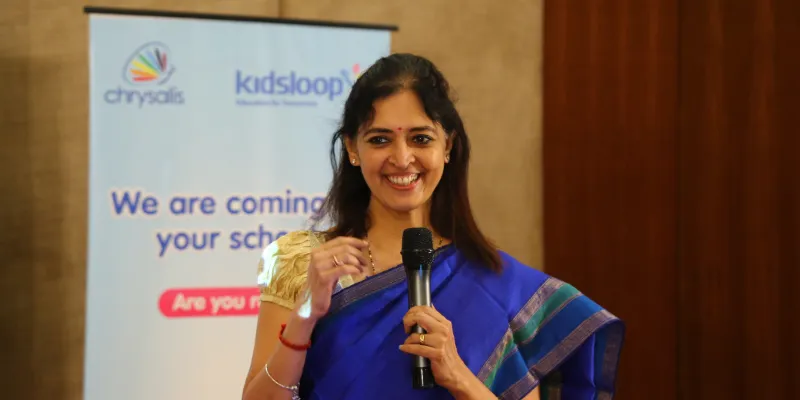How edtech firm Chrysalis is helping children to look beyond classroom learning
Chitra Ravi launched edtech company Chrysalis in 2001 with an aim to help each child realise his or her unique potential.
The edtech space in India witnessed maximum disruption during the pandemic. According to a YourStory research, edtech was the most funded segment in Q3 2021, third only to fintech and financial services startups. Last year, the sector raised a whopping $1.4 billion across 50 deals.
Today, the space is flooded with the likes of , , , , , , and more. From B2B to B2C, the scope for edtech is plenty today. However, around 20 years ago, it was just an emerging segment.
Chitra Ravi, whose daughter was in kindergarten in 2001, saw certain gaps in the education system. Something about the system was stopping children from realising their unique potential, she tells SMBStory.
An MBA graduate from Madras University, Chitra, who barely had any experience in the education space, decided to take the leap and launched in 2001.
Formerly known as EZ Vidya, today the edtech company has built a sizable presence across 1,800 schools in India, and also has presence in eight countries, including Africa and Singapore.
Chitra says she started the Chennai-based company by investing more than Rs 10 lakh, which included a mix of her own savings and funds contributed by her family. The company clocked Rs 36 lakh revenue in its first year. In FY20, Chrysalis clocked Rs 30 crore which came down to Rs 24 crore in FY21. However, Chitra is confident that Chrysalis will close the current fiscal with Rs 50 crore in revenue.
In an interaction with SMBStory, Chitra talks about how the company is bringing about a metamorphosis in the education sector.
Making a mark
While planning for her daughter’s education, Chitra felt every child is unique and schools mostly have a habit of boxing everyone in tailor-made standards. Chitra would often speak to parents of other children to discuss their children’s performance and lack of fulfilment was a common thread that bound these conversations.
“I always liked taking control of things. So I felt I was done with all the complaining and ruminating about the school. I wanted to create a system that would help awaken the unique potential of every child…,” she says.
However, starting off a business in a field that “was barely emerging” was not easy, she clarifies. “The edtech climate is very mature now. It is a very different thing today to launch an edtech startup.”
When she started off designing curriculums and reaching out to schools, she received all kinds of feedback -- both pleasant and unpleasant. Some did not believe in her because she lacked a strong background in the education space, and others took offence as they thought the traditional way of teaching using textbooks are the most sought-after methods.
However, she continued developing methods that would “transform mundane classroom teaching to stimulating educational sessions”.

Armed with eight people during the first year, EZ Vidya was able to onboard 350 students in its first year. It didn’t make any profit but turned profitable in the second year.
Till about 2010, EZ Vidya was majorly involved in training teachers, principals, giving workshops on how to enable children to “think deeper and look beyond.” It also partnered with corporates like DELL, Microsoft, Wipro, and Nokia for their corporate social responsibility (CSR) partnerships.
Think deeper and look beyond
The core philosophy of the curriculum designed by Chitra and her team is based on “think deeper and look beyond”.
“We follow a question-based pedagogy. When you state facts, you merely communicate information to the students. However, if you want the child to think, then that will happen by asking more and more questions,” says Chitra.
She adds that asking questions will enable them to explore, think deeper, and come up with certain answers. The teacher can further provide support with more knowledge and education-driven content.
Another aspect of the curriculum is reflective thinking. “This was needed to enable children to look within,” she says, adding, “For instance, we ask them what they would do when they see a plant, which looks like it is dying while coming to school or going home?”
She says that children think deeper and come up with different responses such as “I will just continue to walk home” or “I will look for water nearby and pour it on the plant!”
However, the company’s major breakthrough came in 2011 when it launched its flagship online product -- Thinkroom.
Soon after, the brand changed its name to Chrysalis, which means the transformation of an egg into a caterpillar, one of the most important stages in a butterfly’s journey.
Thinkroom provides schools a platform from where they can use the curriculum based on Chrysalis’ core teaching philosophies. At present, it is available from nursery to grade five. Chitra says she is soon planning to come up with courses for classes six to eight soon.
The cost for each course typically ranges between Rs 1,500 to Rs 3,500. Currently, more than 1,800 schools, 25,000 classrooms, and nine lakh students have deployed the course since its launch.
Technology, partnerships, and the pandemic
The COVID-19 pandemic played a major role in bringing technology to the forefront of the Indian education system. Chitra says that the coming times will require them to go deeper into integrating technology into the existing structures. In fact, they are already taking steps to do so.
As of now, Chrysalis has partnered with global edtech company Kidsloop to bring education-driven artificial intelligence and other technologies to Indian classrooms. Chitra says, Chrysalis is also trying to personalise Kidsloop products for Indian sensibilities.
One of the things this partnership aims to achieve is to have more data on the growth of a child’s learning journey -- say from three years to 13 years.
“Data is very critical for personalised learning,” she adds. This data will be for the consumption of four key stakeholders - the school, teachers, parents, and the child.
Through this partnership, Chitra also plans to penetrate into markets such as Sri Lanka and Malaysia in the coming years.
Today, there is much debate about education and the integration of technology. Chitra says that both are important to make informed decisions related to a students, but education must be the base of all activities.
Edited by Megha Reddy









